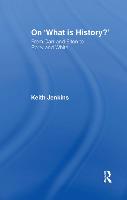In, "On "What is History?"" Keith Jenkins expands on his highly successful "Rethinking History" and bring the "history question" up to date. The author argues that the older modernist texts, including those of Carr and Elton, are now only partial guides to contemporary debates. He lobbies for an embracing of the postmodernist approaches of such thinkers as Richard Rorty and Hayden White.
In the introduction, Jenkins contextualizes the places of Carr and Elton, and Rorty and White in the contemporary debate concerning the nature of history. He goes on to give radical critiques of Carr and Elton in the first two chapters. In the last sections, Jenkins introduces Rorty and White, postmodern thinkers who in his opinion represent a way forward in today's historiographical debates.
Jenkins' exploration of Hayden White's work is particularly significant. White has long been recognized as one of the most original history theorists currently writing, but his work is little readand little understood in many orthodox historical arenas. Jenkins argues that this neglect of White and a concurrent suspicion of "theory" among many historians are issues which need to be urgently addressed.
"On "What Is History?"" enables readers to gain a clear undertstanding of the current debates in history and historiography, an understanding that necessarily moves beyond Carr and Elton.

